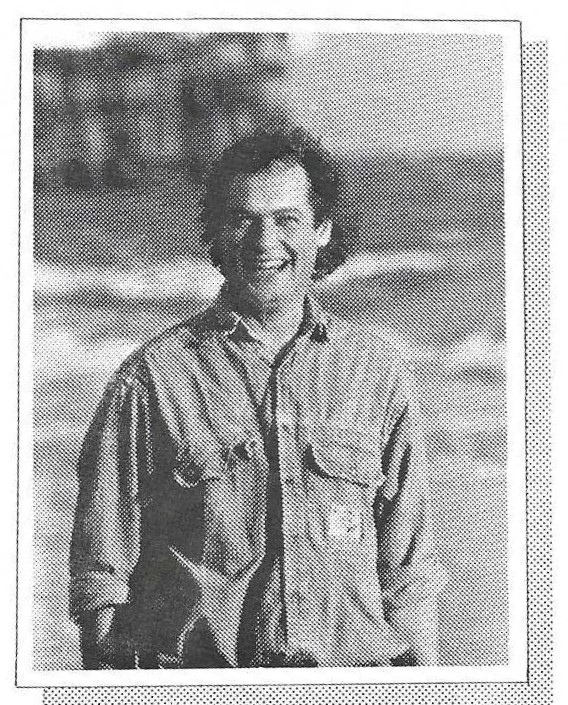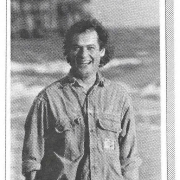MONTHLY BLOG 131, REMEMBERING ADRIAN AGAIN
If citing, please kindly acknowledge copyright © Penelope J. Corfield (2021)

|
Adrian Corfield, |
Thinking about ‘Being Penelope’ (BLOG/130 October 2021) got me remembering – again – my next brother Adrian (1946-90). We were the oldest two of a close-knit tribe of six siblings. I’ve web-posted my obituary of him already.1 So I am not planning to repeat myself. Instead I am just distilling my thoughts on how bereavement feels, thirty-one years later.
Thoughts of Adrian are woven into my life. They don’t need to come at special moments. He was a happy person, one might say happy-go-lucky. So my memories are usually joyous ones. His smiling face is like a benison.
One fun thing, when we were kids, was our laughing game. It was an enjoyable way of passing the time, if we were confined to home by bad weather (say) on a dank November afternoon. One sibling would be selected to start laughing. The rest were enjoined to keep their faces straight. The test was to see how long the non-laughers could resist. Adrian was especially good at giving a contagious chuckle and making funny faces. Soon we would all be laughing uncontrollably. And if a parent popped in to ask: ‘What’s the joke, kids?’ our glee was redoubled. It was not a game which we played all the time. But it was a great reserve for raising everyone’s spirits on a gloomy afternoon. And shared laughter is very bonding.
Remembering an emotionally close sibling also reminds me of the almost instinctive bonds between children brought up together from the earliest age. There are many people in life to whom I feel warm links. Yet those are all, to a greater or lesser extent, chosen and cultivated during my lifetime. My bond with Adrian was not something that I chose. It just happened, because we were very close in age within an emotionally tightly-knit household. I would not say that I understood all of Adrian’s thoughts, especially as we got older and our daily lives diverged. Yet, when young, I effortlessly understood his emotions, moods and reactions, just as he understood mine. Quite probably twins who are close and are brought up together feel this form of identification even more strongly.
Consequently, when Adrian died, I felt that an entire branch of my specialist knowledge was nullified. It was a bit like losing an arm or a leg. It’s a shock that always remains a shock. Plenty of other people know me tolerably well, as I know them tolerably well. But no-one now understands my reactions in the instinctive way that Adrian did. It’s not a matter that I go round bewailing. In some ways, it’s quite nice to maintain my adult mystery. Yet it’s still a startling experience, to lose someone who was so close. (And talking with others who have lost siblings, I know that shocked feeling is quite common).
Lastly, as life continues, I am increasingly conscious of one big issue which concerned Adrian greatly. He was a biologist; and, in the 1980s, was already lecturing his friends and family on the importance of maintaining global biodiversity. How right he was; and is!
Today, he would be beside himself with anxiety about climate change. As the urgency of the issue escalates, he would be one of the very many calling for immediate action to halt the process or at least to coordinate global attempts at alleviation. Adrian was not a political joiner. So he never became a member of the Greens, though that was the logic of his position. Today, I am sure that he would be marching with the recent crowds of protestors in London (as in many other international capitals) against the role of the big banks in funding fossil fuel extractions.
Would the failure of the world’s political leaders to undertake serious action during the last thirty years alarm him? Greatly. Would it dent his chronic optimism? Perhaps somewhat, though he would doubtless rally to say that the global emergency will finally force everyone, not least political leaders, to take urgent action. `
And what else? He would echo the brilliantly succinct warning from Greta Thunberg: ‘There is no planet-B’.
ENDNOTES:
1 PJC, ‘Remembering Adrian Corfield (1946-90)’, in https://www.penelopejcorfield.com/PDFs/7.4.3-Corfield-Adrian-Memories.pdf. With my siblings, we organise an annual walk in his honour on the majestic outcrop of Beachy Head, near Eastbourne: views are magnificent and larks sing high above.
For further discussion, see Twitter
To read other discussion-points, please click here
To download Monthly Blog 131 please click here

